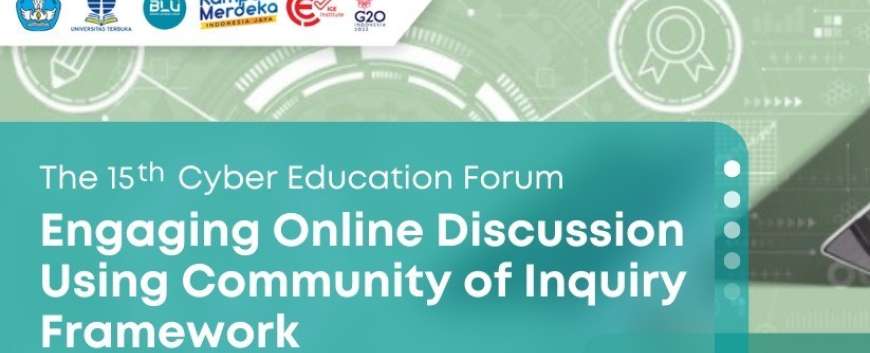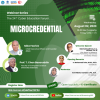- Posted by Khafi Mubegi
- 30 Aug 2022
- INTERNASIONAL
- Total View 0
The 15th CEF: Engaging Online Discussion Using the Community of Inquiry Framework
Indonesia Cyber Education Institute (ICE-Institute) once again presented the 15th Cyber Education Forum (CEF) Universitas Terbuka on “Engaging Online Discussion Using the Community of Inquiry Framework” on Tuesday, 30 August 2022. The 15th Cyber Education Forum was held through Zoom Meeting followed by more than 150 participants and broadcast live on YouTube UT TV channel.
In this opportunity, ICE presented four credible resourceful persons, who are Lee Rubenstein, edX’s Vice President of Partnership at 2U/edX and Business Development, Loh Ley Ley, Principal Consultant edX for Asia, Dr. Uwes Anis Chaeruman, M.Pd., Researcher of State University of Jakarta or Universitas Negeri Jakarta, and Robyn Belair, Learning Designer at edX.

The sequence of the event was opened by the remarks from UT’s Vice Rector for Institutional Development and Partnership Affairs, Rahmat Budiman, M.Hum., Ph.D. He stated that the Covid-19 has transformed the learning system which used to be done face to face in class, and now it has shifted to online learning. Teachers, students, and parents who are not ready to cope with such transformation are called, as Ministry of Education and Culture refers it to, the “lost generation.” Therefore, it is expected that participants will be able to share knowledge through this webinar on how to deal with the existing challenges. The methods of material presentation online as well as the interaction between the teachers and students so the online learning will have the same quality as that of the conventional one.
Furthermore, the program continued with presentation session. The session was divided into two parts. Lee Rubenstein and Robyn Belair gave the first part of the session with the topic on “Engaging Online Discussion using the Community of Inquiry (COI) Framework.” In the presentation, edX believes that higher education is the crucial factor that can promote human potentials so they can contribute more for the advancement of the society. Therefore, edX offers more than 4,000 digital programs, including the academic degrees that are available for any persons who are interested. At the end of the program, the participants will receive certificates that they can use for both academic and professional purposes.
Still in the same presentation, Robyn Belair illustrated the Community of Inquiry. He emphasized that the construction of knowledge is active. Learning process is the social activity than can be meaningful if there is students’ active participation in the social interaction. The interaction can be performed in person face-to-face or online. Teachers play significant roles in order to create the study atmosphere that bring about the sense of community in so that the learning and teaching activities can be more effective. It can be achieved with the use of friendly tone and by encouraging the students to have the courage to express their opinions and share their experience with other students.
The second part was the presentation of Loh Ley Ley and Dr. Uwes Anis Chaeruman, M.Pd. The first presenter of this part, Loh Ley Ley explained on how edX can support the learning process of its users. edX has worked together with a number of organizations and institutions, one of which is IBM, that provides the programs that can be converted into semester credit units in university. It will greatly help the students save their time so they can graduate on time.
Finally, the presentation of Dr. Uwes Anis Chaeruman, M.Pd. focused on the discussion on learning experience. He stated that the essence of e-learning is the use of information technology and computer technology to create educational experience. In addition to the use of state-of-the art technology, it is important for teachers to engage their students in the learning and teaching activities. There are 3 important aspects that will create educational experience, namely: social presence, cognitive presence, and teaching presence. One aspect that teachers need to look into further is teaching presence, which is how to design, facilitate, and direct cognitive and social processes in order to create a meaningful educational experience.
The 15th Cyber Education Forum (CEF) was closed with a question-and-answer session and the presentation of digital certificate of appreciation by ICE Institute Director, Prof. Paulina Pannen.






